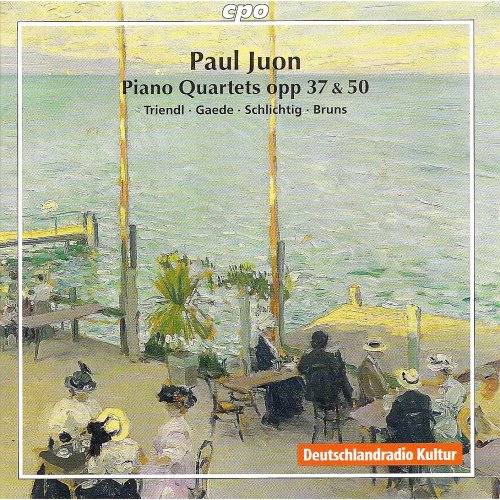
Oliver Triendl, Daniel Gaede, Hariolf Schlichtig, Peter Bruns - Juon: The Piano Quartets (2008)
BAND/ARTIST: Oliver Triendl, Daniel Gaede, Hariolf Schlichtig, Peter Bruns
- Title: Juon: The Piano Quartets
- Year Of Release: 2008
- Label: CPO
- Genre: Classical
- Quality: flac lossless (tracks) +Booklet
- Total Time: 01:01:53
- Total Size: 274 mb
- WebSite: Album Preview
Tracklist
01. Piano Quartet No. 2 In G Major, Op. 50: I. Moderato
02. Piano Quartet No. 2 In G Major, Op. 50: II. Scherzo: Presto Non Troppo
03. Piano Quartet No. 2 In G Major, Op. 50: III. Adagio Lamentoso
04. Piano Quartet No. 2 In G Major, Op. 50: IV. Allegro Non Troppo
05. Piano Quartet No. 1 In D Minor, Op. 37, "Rhapsody": I. Moderato
06. Piano Quartet No. 1 In D Minor, Op. 37, "Rhapsody": II. Allegretto
07. Piano Quartet No. 1 In D Minor, Op. 37, "Rhapsody": III. Sostenuto
Although it has taken several years since his death, the compositions of Paul Juon are increasingly being given the attention, performances, and recordings that they very much deserve. Juon was a contemporary of a number of better recognized composers -- including Reger, Scriabin, and Schoenberg -- but while the trend at the time may have been looking forward to new frontiers in music, Juon's output is very much rooted in the late Romantic style. Fans of this musical idiom will no doubt take great joy in the discovery of a composer who wrote so freely, easily, and competently in this style.
This CPO album features Juon's two piano quartets, each one a masterpiece of the genre. The ensemble is led by pianist Oliver Triendl, who has spent a significant portion of his performance career championing the recordings of neglected compositions. The string players, each accomplished musicians in their own right, are not drawn from an extant performance ensemble. As is often the case, such ensemble casts in chamber music have their definite ups and downs. On the plus side, the group's interpretation of the two piano quartets is magnificently impassioned and insightful. Each plays with a tremendous amount of conviction and intensity, making the overall sweep of the performance quite captivating. The downside is that the string players do not always agree on a center of pitch. Although this problem is not constant by any means, when it does come up, it's fairly severe. Still, the other aspects of the performance are extremely satisfying, so if you don't mind occasionally wincing at chords that don't exactly line up, then this album is still a good choice.
01. Piano Quartet No. 2 In G Major, Op. 50: I. Moderato
02. Piano Quartet No. 2 In G Major, Op. 50: II. Scherzo: Presto Non Troppo
03. Piano Quartet No. 2 In G Major, Op. 50: III. Adagio Lamentoso
04. Piano Quartet No. 2 In G Major, Op. 50: IV. Allegro Non Troppo
05. Piano Quartet No. 1 In D Minor, Op. 37, "Rhapsody": I. Moderato
06. Piano Quartet No. 1 In D Minor, Op. 37, "Rhapsody": II. Allegretto
07. Piano Quartet No. 1 In D Minor, Op. 37, "Rhapsody": III. Sostenuto
Although it has taken several years since his death, the compositions of Paul Juon are increasingly being given the attention, performances, and recordings that they very much deserve. Juon was a contemporary of a number of better recognized composers -- including Reger, Scriabin, and Schoenberg -- but while the trend at the time may have been looking forward to new frontiers in music, Juon's output is very much rooted in the late Romantic style. Fans of this musical idiom will no doubt take great joy in the discovery of a composer who wrote so freely, easily, and competently in this style.
This CPO album features Juon's two piano quartets, each one a masterpiece of the genre. The ensemble is led by pianist Oliver Triendl, who has spent a significant portion of his performance career championing the recordings of neglected compositions. The string players, each accomplished musicians in their own right, are not drawn from an extant performance ensemble. As is often the case, such ensemble casts in chamber music have their definite ups and downs. On the plus side, the group's interpretation of the two piano quartets is magnificently impassioned and insightful. Each plays with a tremendous amount of conviction and intensity, making the overall sweep of the performance quite captivating. The downside is that the string players do not always agree on a center of pitch. Although this problem is not constant by any means, when it does come up, it's fairly severe. Still, the other aspects of the performance are extremely satisfying, so if you don't mind occasionally wincing at chords that don't exactly line up, then this album is still a good choice.
As a ISRA.CLOUD's PREMIUM member you will have the following benefits:
- Unlimited high speed downloads
- Download directly without waiting time
- Unlimited parallel downloads
- Support for download accelerators
- No advertising
- Resume broken downloads


